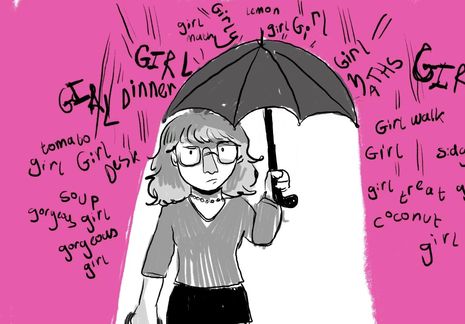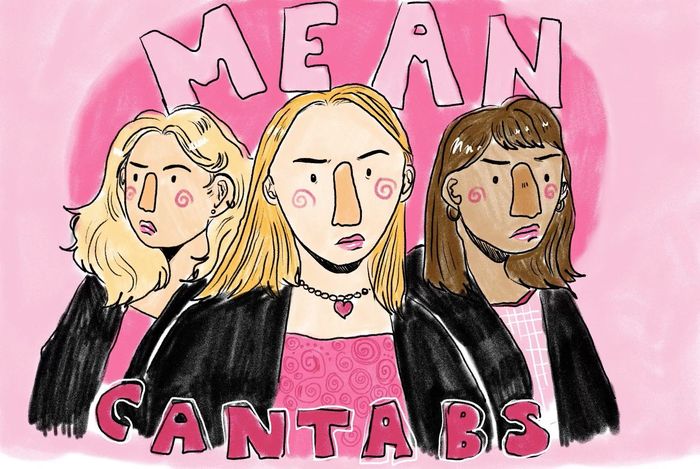What on earth is a ‘girl desk’?
Girl dinner, girl maths – and now ‘girl desk’. Hannah Gillott asks: when will it end?

In secondary school, I had a teacher who refused to call us “girls”. Instead, he went for “ladies”, making what I can only assume he thought was a respectful swap. In all honesty, it just sounded creepy, and, thank God, it didn’t catch on. His aversion to such a simple descriptor was a little hypocritical – he was teaching form 7G, and the G stood for ‘Girls’ – but it wasn’t all that surprising. After all, as much as we hated being called “ladies”, we hated being called “girls” even more.
The late 2010s were the heyday of not-like-other-girls feminism, and my school was no different. None of us wanted to be seen as stupid, as shallow, as emotional. None of us wanted to be worth less, and God knows none of us wanted to be girls. So believe me when I say I couldn’t be happier that now being a girl is all the rage. I have a charity shopping addiction, I wear mini skirts which are slightly dangerous, I know the name of every Kardashian’s child (in age order, beginning with Mason), and I absolutely, unashamedly, love a gossip.
“feminism seems to have taken a turn toward a new, purportedly progressive, gender essentialism”
But yesterday I saw something which pushed even me too far – ‘girl desk’. What the hell is a ‘girl desk’? Girl dinner, I understood. I even had an analysis of it prepped and ready to go for every time it was made fun of – that for many women, the option of a meal you can throw together, rather than labour over cooking, is a luxury. Unpaid domestic labour, the female burden, etc etc. You get it. Yes, the discursive feminisation of the act of eating a teeny little dinner reminded me of the pro-ana content Tumblr used to be rife with. Yes, I didn’t like the packed-lunchy infantilization of women. But I defended girl dinner, even if I cringed while doing it. Girl desk, though, takes it too far.
For decades, women have fought against gender essentialism. Feminism has consistently been opposed to the traditionally conservative idea that women and men, due to some inherent difference, ought to inhabit different spheres, eat different things, and, I would hazard to guess, work at different desks. And yet now, especially among our generation, feminism seems to have taken a turn toward a new, purportedly progressive, gender essentialism. We girlboss with girlmath and we go on a hot girl walk during hot girl summer. Except most of the people doing that aren’t girls, they’re women. Three dimensional women who are reducing themselves to being ′tomato girls′ or ‘coconut girls’; ‘lalalala girls’ or ‘okokok girls’ (I’m serious).
“I’m glad that we reclaimed girlhood”
Of course, a lot of this is tongue-in-cheek, and I appreciate that. But when I’m shopping with a friend and they call my (perfectly correct) calculation of cost-per-wear ‘girlmath’, I can’t help but feel that we’ve regressed. Because if a girl dinner is a tiny portion of food, if girl math is maths which doesn’t really make sense, and if girl desks are messy, without any space for a single book, then what on earth is a ‘girl’?
This isn’t just restricted to the girl-noun of your choice phenomenon. Contemporary spirituality is telling women to lean into their ‘divine femininity’. Apparently, if I have a problem, it’s not because I have a real, adult, human issue I need to solve, it’s that I’ve been ‘in my masculine’. Shit. Sorry. The cure, apparently, is to reclaim my divine femininity.
Of course, there’s no problem with working on compassion, openness, and intuition, or other traditionally ‘feminine’ characteristics. The issue is with seeing them as inherently feminine, as qualities which only women can have, rather than traits which women are encouraged to develop. Maybe I’m out of the loop, but I thought we were meant to be challenging gender roles, not reinforcing them with New Age spirituality.
I’m glad that we reclaimed girlhood. The 2010s were a toxic decade in which, in order to reject any allegation of bimboism, we denied ourselves the joy of gossiping for hours over who fancied whom. And, in my own way, I am reclaiming girlhood as – dare I say it – a woman. I go out for overpriced cocktails and lie in bed watching When Harry Met Sally. But I’m not a girl, I’m an adult (ish). And suggesting that women can’t discuss politics without dumbing it down with a valley accent and a sleepover analogy isn’t empowerment, it’s sexism.
 News / Cambridge students set up encampment calling for Israel divestment6 May 2024
News / Cambridge students set up encampment calling for Israel divestment6 May 2024 News / Cambridge postgrad re-elected as City councillor4 May 2024
News / Cambridge postgrad re-elected as City councillor4 May 2024 News / Proposed changes to Cambridge exam resits remain stricter than most7 May 2024
News / Proposed changes to Cambridge exam resits remain stricter than most7 May 2024 News / Some supervisors’ effective pay rate £3 below living wage, new report finds5 May 2024
News / Some supervisors’ effective pay rate £3 below living wage, new report finds5 May 2024 Fashion / Class and closeted identities: how do fits fit into our cultures?6 May 2024
Fashion / Class and closeted identities: how do fits fit into our cultures?6 May 2024






